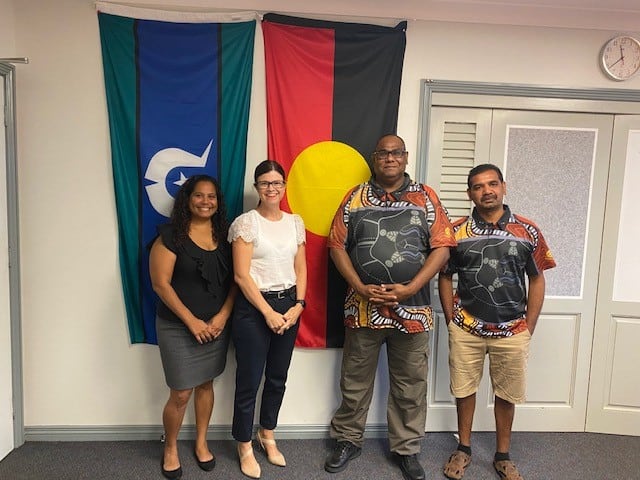Far North Queensland Visit

Pictured (left to right): Deanne Minniecon, Principal Advisor – First Nations Communities, HWQld ; Robyn Littlewood, Chief Executive, HWQld; Mayor Ross Andrews, Yarrabah Aboriginal Shire Council; and Brian Underwood, Councillor, Yarrabah Aboriginal Shire Council.
Robyn Littlewood, Chief Executive; Simone Nalatu, Principal Lead – First Nations Communities; and Deanne Minniecon, Principal Advisor – First Nations Communities recently visited Far North Queensland to meet with several key Aboriginal and Torres Strait Islander people and organisations to further support the food security agenda.
Preventive health measures and equity for rural and remote Aboriginal and Torres Strait Islander communities is fundamental in our work which is why our recent trip to the Far North was so critical.
It is the people, the networks and the leadership in these beautiful regions that are making the difference. Having the opportunity to meet more of our Queensland champions and seeing first hand how they are making healthy happen for their communities is always inspiring but more importantly propelling our collective agenda.
Consistent access to affordable, nutritious food (otherwise known as food security), or lack thereof, remains evident in parts of Far North Queensland, and is at the heart of some of the most complex challenges within these communities.
The Federal Parliamentary Inquiry into food pricing and food security in remote Indigenous communities to which we made a submission, delivered a report and recommendations published in December 2020—it provided much needed optics on a problem that many have known about for too long, yet haven’t had the structural support to address. It also shone a light on collaborative practices, brought on by a global pandemic, that meant communities were closed off and more resourceful ways were developed to get food to where it needed to be.
The learnings out of the Inquiry and practices is what we must harness—and part of our role is to support those organisations on the ground to deliver more of what worked during 2020.
Discussions with Apunipima Cape York Health CEO, Debra Maltouse; and Frankie Clive, Executive Manager, Primary Health Care centred around its food security work, and confirmed the path we’re taking in supporting some of the region’s key organisations is accurate and much needed.
We met with Bevan Ah Kee, General Manager – Sector Development; Cleveland Fagan and Jason Fagan of Queensland Aboriginal and Islander Health Council (QAIHC), which is the peak body representing the Aboriginal and Torres Strait Islander Community Controlled Health Sector. We discussed their work in preventive health, food security and health inequity, and how we can find ways of supporting them. Our plan is to truly partner and support these local champions who are already leading the way and making a difference for their communities.
We also met with Marnie Wettenhall, Regional Manager North Qld Regional, Eastern Division; Michael White; and Connie Archer of National Indigenous Australian Agency (NIAA)—responsible for whole-of-government coordination of policy development, program design, and service delivery. In response to recommendations out of the Inquiry, NIAA briefed us on how it is working to support Far North remote communities and where further support might amplify their work.
The HWQld delegation also met with the Stronger Mob Living Longer Working Group, whose remit is a focus on prevention and is made up of community controlled health services, local HHSs, and the Royal Flying Doctors Service from across Far North. To find mutual opportunities and linkages, our presentation to this group aligned our work with its Working Group 2021 action plan. Ongoing discussions are underway on how we might best work together.
Yarrabah Aboriginal Shire Council is one of the largest Aboriginal and Torres Strait Islander communities outside the areas of The Torres and Cape, and we met with Ross Andrews, Mayor to discuss some of its unique challenges. Due to its size it often deals with greater complexity and scale than other communities, yet its challenges still come from the same root causes.
One of the ways we’re working to support these communities is via an upcoming ECHO® learning series on Creating a Healthier Remote Food Stores Environment. This learning opportunity will give participants insight into 9 key areas for working together with remote stores business owners and operators to build nutrition workforce capacity to facilitate positive, sustainable change. Initially this training is being offered to Community Enterprise Stores, and talks out of this visit will help us to offer this opportunity to independently owned stores.
We have a very clear and strong agenda to support our First Nation’s peoples: we have outstanding leaders, partners and local champions already on the journey and we have communities ready for such change. It is time to make more progress in Closing the Gap. We have to stand together to make a meaningful difference to the lives of Aboriginal and Torres Strait Islander Queenslanders and now is the time to do it.
We’d like to sincerely thank all those who hosted us in the north. The learnings and insights are invaluable, appreciated and have helped focus our collective efforts.


